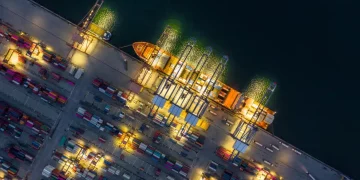Key Themes in the Report
- Trade Policy Evolution
The report explores expected changes in U.S. trade policy, focusing on:- Adjustments to tariffs impacting key industries.
- The renegotiation or introduction of international trade agreements.
- Enhanced regulatory frameworks for compliance, especially for cross-border logistics.
- Economic Projections
With in-depth analysis, Magaya outlines potential economic impacts of trade shifts, forecasting both risks and opportunities. Key areas include:- Supply chain disruptions due to tariff changes.
- Cost implications for logistics providers and their clients.
- Growth in trade with specific regions under new agreements.
- Strategic Guidance for Providers
Magaya provides actionable recommendations for logistics companies, emphasizing the importance of agility and technology. Suggested steps include:- Investing in digital tools for compliance and documentation.
- Optimizing operations with automation to stay competitive.
- Developing contingency plans to mitigate risks from sudden trade disruptions.
Impacts on Logistics Providers
The evolving U.S. trade landscape will have significant implications for logistics providers, including:
- Increased Compliance Challenges: Stricter regulations will demand better tracking and reporting systems.
- Cost Pressures: Tariff adjustments may lead to fluctuating shipping rates and operational costs.
- Opportunities for Growth: New trade agreements could open markets for logistics companies specializing in specific regions or industries.
Magaya’s Tools for Success
The report emphasizes the importance of leveraging technology to meet these challenges. Magaya’s Digital Freight Platform offers:
- End-to-End Automation: Streamlining documentation, customs clearance, and shipment tracking.
- Real-Time Insights: Providing data analytics to improve decision-making and efficiency.
- Compliance Management: Keeping businesses updated with the latest regulatory requirements.
Expert Perspectives
Magaya’s leadership highlights the critical role of technology in navigating trade policy shifts.
“Logistics providers must embrace innovation to stay competitive,” said a Magaya spokesperson. “Our report offers the insights and tools needed to adapt to the changing trade environment effectively.”
Future Outlook
Magaya’s 2025 Trade Policy Outlook underscores the growing complexity of global logistics. Companies that adopt proactive strategies and invest in advanced technologies will be better positioned to thrive in this dynamic environment.
As the logistics sector continues to evolve, this report provides essential guidance for providers looking to streamline operations, maintain compliance, and seize new opportunities in a rapidly changing trade landscape.
Key Themes in the Report
- Trade Policy Evolution
The report explores expected changes in U.S. trade policy, focusing on:- Adjustments to tariffs impacting key industries.
- The renegotiation or introduction of international trade agreements.
- Enhanced regulatory frameworks for compliance, especially for cross-border logistics.
- Economic Projections
With in-depth analysis, Magaya outlines potential economic impacts of trade shifts, forecasting both risks and opportunities. Key areas include:- Supply chain disruptions due to tariff changes.
- Cost implications for logistics providers and their clients.
- Growth in trade with specific regions under new agreements.
- Strategic Guidance for Providers
Magaya provides actionable recommendations for logistics companies, emphasizing the importance of agility and technology. Suggested steps include:- Investing in digital tools for compliance and documentation.
- Optimizing operations with automation to stay competitive.
- Developing contingency plans to mitigate risks from sudden trade disruptions.
Impacts on Logistics Providers
The evolving U.S. trade landscape will have significant implications for logistics providers, including:
- Increased Compliance Challenges: Stricter regulations will demand better tracking and reporting systems.
- Cost Pressures: Tariff adjustments may lead to fluctuating shipping rates and operational costs.
- Opportunities for Growth: New trade agreements could open markets for logistics companies specializing in specific regions or industries.
Magaya’s Tools for Success
The report emphasizes the importance of leveraging technology to meet these challenges. Magaya’s Digital Freight Platform offers:
- End-to-End Automation: Streamlining documentation, customs clearance, and shipment tracking.
- Real-Time Insights: Providing data analytics to improve decision-making and efficiency.
- Compliance Management: Keeping businesses updated with the latest regulatory requirements.
Expert Perspectives
Magaya’s leadership highlights the critical role of technology in navigating trade policy shifts.
“Logistics providers must embrace innovation to stay competitive,” said a Magaya spokesperson. “Our report offers the insights and tools needed to adapt to the changing trade environment effectively.”
Future Outlook
Magaya’s 2025 Trade Policy Outlook underscores the growing complexity of global logistics. Companies that adopt proactive strategies and invest in advanced technologies will be better positioned to thrive in this dynamic environment.
As the logistics sector continues to evolve, this report provides essential guidance for providers looking to streamline operations, maintain compliance, and seize new opportunities in a rapidly changing trade landscape.























